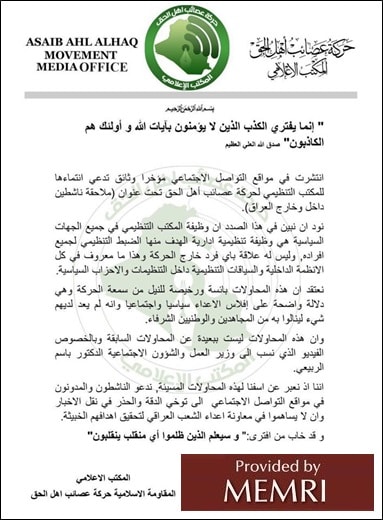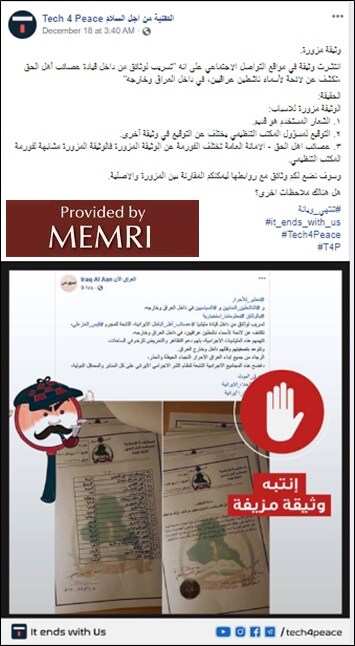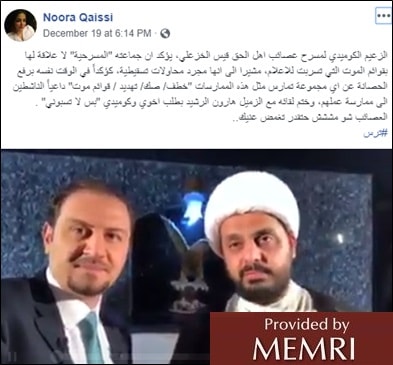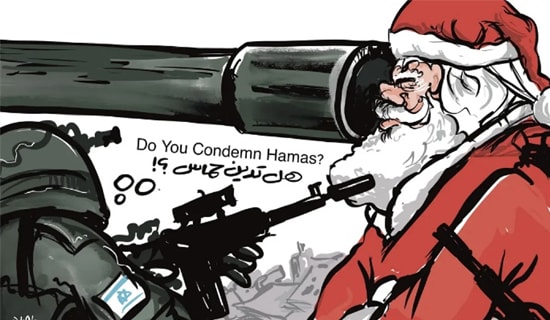Over the past three months, Iraqi journalists covering the anti-government demonstrations appear to be facing growing pressure from pro-Iran militias according to local media. The assassination of two reporters in Basra on January 10, 2020, is the latest example of an escalating threat to silence media coverage supportive of the protests. Ahmad Abdel-Samad, a 39-year-old correspondent for the local television station Dijla, and his cameraman Safaa Ghali, 37, were killed near a police station late on Friday in Basra when a group of armed men in a 4x4 vehicle approached their car and opened fire, according to witnesses.

Ahmad Abdel Samad, a 39-year-old correspondent for local television station Dijla, and his cameraman Safaa Ghali, 37, were killed near a police station late on Friday in Basra. (Source Radio Al-Mirbad)
Their killing comes only a few days after correspondents from the U.S.-funded Al-Hurra TV in Najaf and Baghdad announced on their social media accounts that they had submitted their resignations without providing reasons. Reports in Iraqi media have raised questions about the timing of these resignations, pointing out that the correspondents had been in their roles for over ten years and would therefore be unlikely to announce their resignations without giving an explanation.[1]
On December 17, 2019, several Iraqis on social media reported that the Iran-backed Shi'ite militia Asa'ib Ahl Al-Haq (AAH) in Iraq had issued a hit list that includes the names of Iraqi journalists and activists, including Iraqi nationals living abroad, who use social media to show support for the ongoing protests.
While local and pan-Arab media outlets reported that the list includes 700 names, the leaked photos show only 18 names, all of whom live outside Iraq, including those in countries such as the U.S., U.K., France, and Canada.
It is worth noting that the U.S. Treasury Department announced on December 6, 2019, that it sanctioned four Iraqi officials, two of whom are leaders of AAH: Qais Al-Khazali, and his brother Laith Al-Khazali, for their roles in killing protestors.
This report will review the reports on the hit list, and the reactions to it:
On December 17, Noora Qaissi,[2] shared on her Facebook account two photos showing two pages of the AAH hit list. Qaissi, an Iraqi blogger who is based in Sweden, whose name is on the list, explained in her post that the list includes names of bloggers who promote content on social media in support the protesters as well as those who support them financially, warning that those who want to visit Iraq should think twice before doing so. Qaissi said in her post that she can not confirm the authenticity of the photos, adding that she only received a list of 18 names. Qaissi also did not reveal the identity of her source.

One photo shows the official letter, dated December 8, 2019. The letter is signed by the head of the AAH organizational office. The letter was sent from the AAH organizational office to AAH's media and military offices. The letter opens with a Quranic verse, that reads: "Let there arise out of you a band of people inviting to all that is good, enjoining what is right, and forbidding what is wrong: They are the ones to attain felicity". Surah Ali 'Imran [3:104].
The letter further states: "Because Asa'ib Ahl Al-Haq is facing an aggressive assault conducted by foreign agendas, we confirm that the names listed below are among those who support the protests financially or promote them in the media. They are from different provinces and others are based outside Iraq, and their places of residency is included. They are contributing to the escalation inside the country and therefore they should be pursued even if they live abroad."
The second photo shows 18 names of popular Iraqi activists along with their locations, including those who live in the United States, Sweden, Canada, the UK, Germany, France, Cyprus, Turkey, India, and Jordan.
Al-Anwar2, a pro-Popular Mobilization Units (PMU) satellite channel, posted recently a video[3] on its Twitter account identifying some of the names mentioned in the list and accusing them of working as agents for the U.S. and German intelligence. In the video, the channel accuses Ahamd Al-Bashir, an Iraqi comedian, who presents a weekly political satire show on the Arabic Deutsche Welle TV channel, saying that he is inciting violence in Iraq on behalf of the "German BND intelligence."

Another video,[4] released by the channel on its twitter account, identifies U.S. national Steven Nabil, who was mentioned in the AAH hit list, as the one behind the American "sabotage scheme."

AAH Denies Accusation
On December 19, 2019, AHH issued a statement[5] saying that the photos of the documents that are circulating on social media are fake and are aimed at distorting the image of the organization for political reasons. "We would like to make it clear that the documents that have been circulating on social media, that were supposedly leaked from the organizational office of the Asa'ib Ahl al-Haq Movement, under the title (Prosecuting Activists), are fake. The organizational office's role, as in any political organization is restricted to an administrative role, the purpose of which is to manage the organization and the members, and and has nothing to do with anyone outside the movement."
The statement described the leaked documents as "desperate and cheap attempts to distort the reputation of the movement, and a clear indication of the political and social bankruptcy of the enemies [the organization]." It concludes by urging social media activists to seek verification when reporting news, and "not to help the enemies of the Iraqi people in their evil goals."

Tech 4 Peace,[6] the Facebook page of an Iraqi fact-checking organization, confirmed that the documents were fake, saying the logo used in the letters is the old AAH logo, and the signatures on the two pages, which are supposed to belong to the same official, do not match. It further says that the format of the paper used by the Secretary-General of AAH is not the one used in the circulated photos.

"Could Be Fake, Still Intimidating"
Basim Mardan,[7] another activist whose name was on the "fake" list, shared the Tech 4 Peace post while claiming that it was leaked purposely by AAH to "intimidate those who support the protesters." He explains that these kinds of "fabricated" lists are used as a "scare tactic" against Iraqis in Iraq, by saying that they can even get to their critics who live abroad. "They want to say to the Iraqis inside the country that we can get to those living abroad and silence them, so imagine what can we do to you."

A video[8] of Qais Al-Khazali, the leader of AHH, denying the accusation was posted by Noora Qaissi's Facebook account on December 19, 2019. The 36-second video shows Iraqi journalist Haroon Rashid asking Al-Khazali if the hit lists are real. Al-Khazali responds that the lists are fake, saying that he will not provide immunity to any group that will commit practices such as assassinations or abductions against activists. He concludes by asking the activists jokingly "not to curse him." In her post, Qaissi mocks Al-Khazali saying his performance was "comical."

[1] See MEMRI Special Dispatch No. 8486 Iraqi Media Hints Pro-Iran Militias Intimidating Staff Of U.S.-Funded Al-Hurra TV Following Soleimani Assassination; Misinformation Campaign Spreads False Statement Of Secretary Pompeo, January 10, 2020.
[2] Facebook.com, December 17, 2019.
[3] Twitter.com/alanwartv2, December 31, 2019.
[4] Twitter.com/alanwartv2, December 16, 2019.
[5] Nas News, December 18, 2019.
[6] Facebook.com, December 18, 2019.
[7] Facebook.com, December 18, 2019.
[8] Facebook.com, December 18, 2019.





